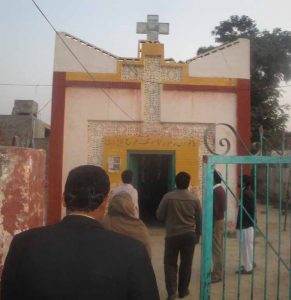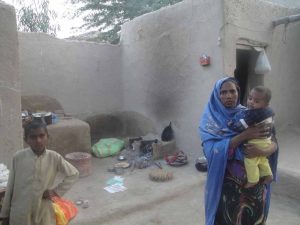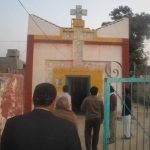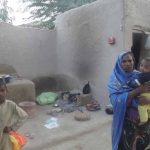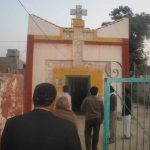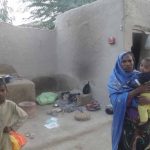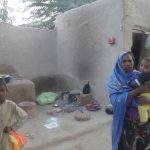The author is the director of the Center for Law and Justice in Lahore, Pakistan.
In a land where “Christian” is synonymous with lowest-caste “untouchable,” many Muslims here believe Parvaiz Masih deserved the series of attacks he and his wife suffered for asking a Muslim to allow him and his donkey cart to pass.
In Sheikhupura District in Punjab Province on Nov. 16, Masih was transporting fodder on Nov. 16 when he came up against a motorcycle parked in the middle of the road. The owner, Ali Hassan, refused to move it, so Masih moved it in hopes of avoiding an altercation, he said.
“How can you, a ‘Chuhra,’ touch my motorcycle?” Hassan asked Masih, and he began to beat the Christian.
Hassan was further offended that a lower-caste Christian dared to defend himself, and as he left he threatened to teach Masih a lesson for raising a hand at someone from the Gill clan, which belongs to the higher agricultural Jat caste, Masih said.
The distinction between being a Christian and being on the lowest strata of Pakistani society is virtually nil for most Pakistanis, so Masih has suffered as much for being a Christian as for being considered too low to touch. In the 1930s the word “Christian” literally replaced the disparaging term “Chuhra” and became synonymous with sweeper or laborer in the Punjab. By the 1950s – and notably in a population census of 1961 – the word “Christian” replaced the official pejorative caste title “Chuhra.”
Thus “Christian” became the Muslim term for despised converts to Christianity in the Punjab. Muslims called these Christians “Isaee,” Arabic for Christian, which became synonymous with “sweeper” or “laborer.” This confusion of caste and religion continues to some degree today in Pakistan in that the “caste” designation required on legal documents can be “Christian.” Thus police First Information Reports and revenue documents mention Christians’ caste as “Christian.”
Settling Scores
Such an ignoble status opens the way for rival castes to use Christians to settle scores.
Members of the Gill clan decided to attack Masih, of Barnala village near Safdarabad, and because a menial Christian worker had dared to hit a Muslim, members of the local hard-line political group Sunni Tehreek joined them, Masih’s legal counsel said. Within a few hours, Hassan and cousins Muhammad Tahir, Muhammad Shahbaz, Muhammad Aftab and seven other men beat Masih in a cattle shed with clubs, kicks, and punches.
Members of the Gill clan, part of the Jat caste, were particularly incensed that a servant of the rival Arains agricultural caste had stood up to Hassan, Masih’s lawyers said.
After beating Masih, the Gills threatened that they would come to his house and beat him there; they also threatened to attack him at the site where he had dared to raise a hand to Hassan. Masih informed his employer, Muhammad Jamil, of the Arain caste and owner of the cattle shed. Jamil was not willing to call police. After the Gills left Masih in bruises, they went to his house and threatened his wife, telling her that if he tried to flee they would beat her too and publicly humiliate her.
Masih was at home when, at about 7:30 p.m., Tahir, Shahbaz, Aftab and some 20 other men attacked his house. Forcibly entering, they beat him again with clubs and the butts of their guns; when his wife Sobia tried to intervene, they beat her too. Shahbaz tore her shirt from the front, a means in Pakistan of deeply humiliating Masih and his family.
The concentration of village Arains happens to be near Masih’s house, and they finally called police. With the arrival of officers and others the Gills fled, but Tahir, Shahbaz and Aftab were still inside Masih’s house, and police were able to take the three Muslims into custody – but have not officially arrested them due to pressure from influential political and religious figures.
Police took Masih and his wife to a hospital for examination, where he received treatment for swelling on his leg from the beating. His wife suffered bruising and other small injuries.
Representatives of the Center for Law and Justice (CLJ), an affiliate of the European Center for Law and Justice, said they believe Masih’s life is in danger. He has no means to withstand strong pressure from the Islamists, politicians and the influential Gill landowners of Sheikhupura, they said.
The refusal to officially arrest the three assailants is a common police practice in Pakistan so that they can easily be released after bribing officers, the attorneys said.
Should tensions over the case heat up, Masih could lose his life because the Arain caste Muslims could use his legal case to take revenge on the Gills of the rival Jat caste, they said.
Several influential Muslims in the area have pressured Masih to withdraw the case. Two men from the Gill clan arrived by motorcycle to Masih’s house on Nov. 21 and fired into the air to intimidate him and his family. Police took no action, lawyers said, due to severe pressure from influential Gill landowners, Member of National Assembly Barjees Tahir and Sunni Tehrik Islamists.
Pressure is building, they said, because one of the three men in police custody is the vice-president of Sunni Tehrik in Safdarabad.
Powers and Authorities
In the concept of caste, one’s occupation and social class is defined by one’s ancestry. Following one’s caste occupation and the practices attached with it is part of the Hindu religious instruction know as dharma. As Pakistan got separated from India and developed its identity as an Islamic state, most Muslims indulge in caste practices without knowing its origins in Hinduism.
Historically, most Pakistani Christians belonged to the caste considered even below the untouchables. The Hindu dharma asserted that the mere sight of these people could incur ritual impurity. For this reason, they were ordered to live outside the village. Homes of rural Christians lie outside most of the villages in Punjab Province. The same is true for Parvaiz Masih’s home, and he is dependent for his livelihood on the Arain land owners. Without any say, Masih has no will of his own – it was the Arains who decided whether Masih would pursue his legal case against the Gills.
As caste is still very much alive in the Islamic Republic of Pakistan, Muslims avoid proximity with the Christians due to the latter’s origins – unknown even to most Pakistani Christians – in low caste. In several places, Muslim barbers refuse to give Christians haircuts, as it involves physical contact. In Sikandarabad village, Kot Radha Kishan, Kasur District, there are about 15 Christian families who cut each other’s hair.
Several Christian students drop out of school because their Muslim classmates refuse to eat, drink and sit with them. This perpetual state of dependency on the upper castes – with the attendant poverty, segregation and marginalization – coupled with religious fanaticism, accounts for why Christians in Pakistan rarely stand up for justice. The oppressive powers thus go uncontested.
###
© 2012 Morning Star News. Articles may be reprinted with credit to Morning Star News.
Morning Star News is a 501(c)(3) non-profit corporation whose mission is to inform those in the free world and in countries violating religious freedom about Christians worldwide who are persecuted for their faith. For free subscription or to make tax-deductible donations, contact [email protected], or send check to Morning Star News, 24310 Moulton Parkway, Suite O # 157, Laguna Hills, CA 92637, USA.
- Parvaiz Masih’s Barnala village church in Pakistan.
- Assailants broke into Parvaiz Masih’s home and attacked him and his wife Sobia.
- Parvaiz Masih’s Barnala village church in Pakistan.
- Assailants broke into Parvaiz Masih’s home and attacked him and his wife Sobia.
- Assailants broke into Parvaiz’s home and attacked him and his wife Sobia.
